【新课标】Unit 6 Caring for your health 第3课时Grammar课件
文档属性
| 名称 | 【新课标】Unit 6 Caring for your health 第3课时Grammar课件 | 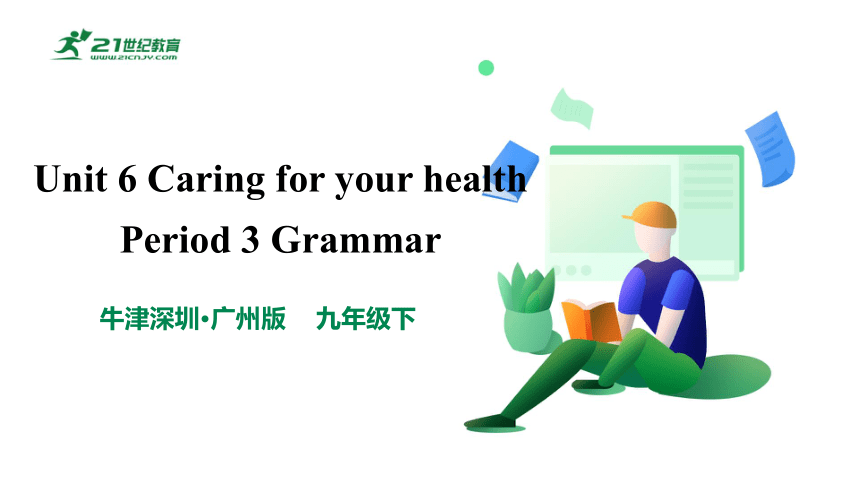 | |
| 格式 | pptx | ||
| 文件大小 | 14.5MB | ||
| 资源类型 | 试卷 | ||
| 版本资源 | 牛津深圳版 | ||
| 科目 | 英语 | ||
| 更新时间 | 2023-03-02 17:10:28 | ||
图片预览

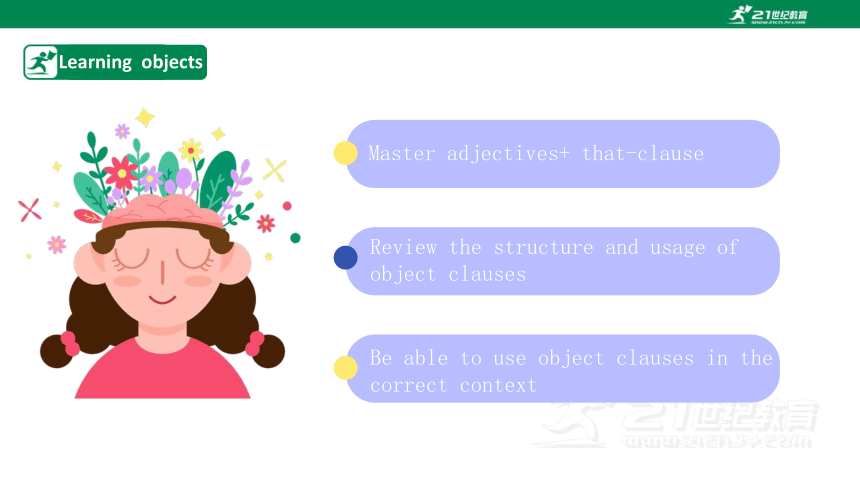
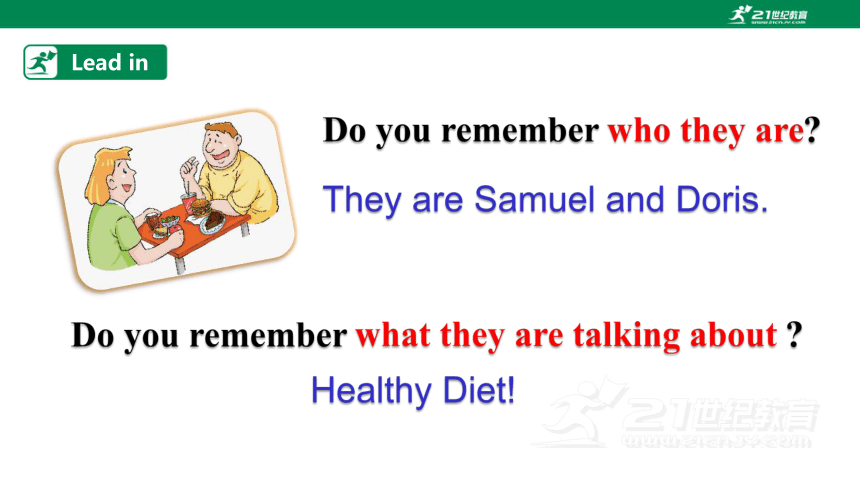
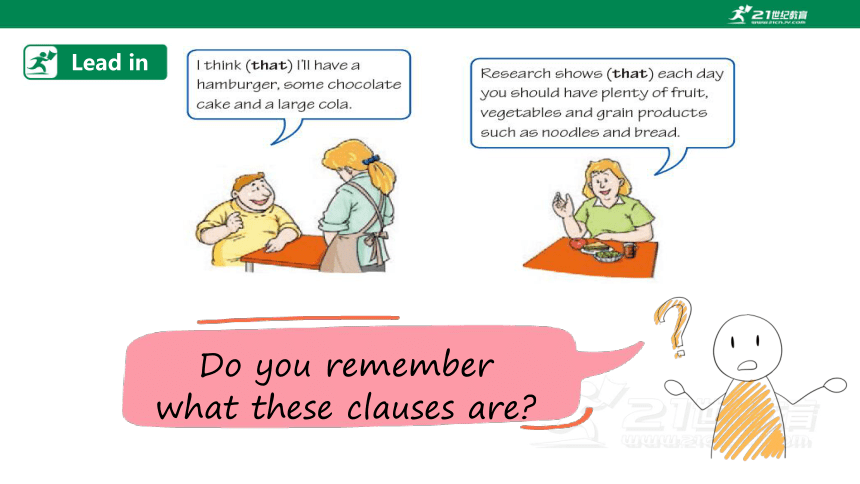
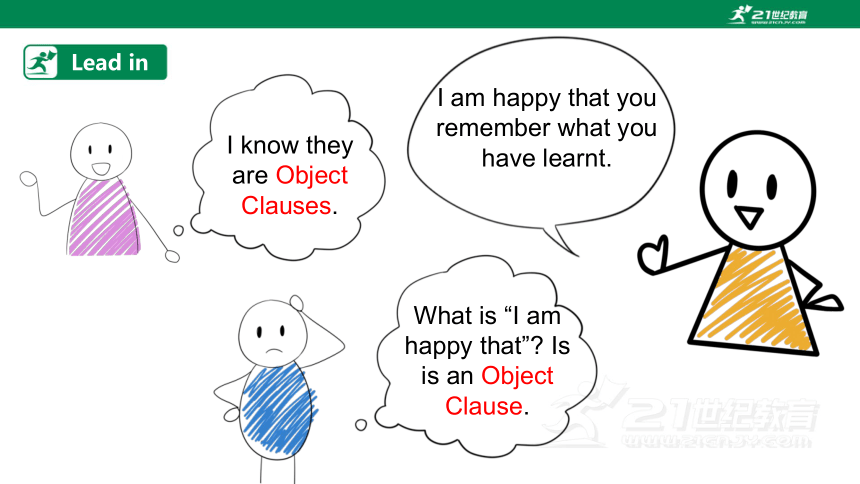
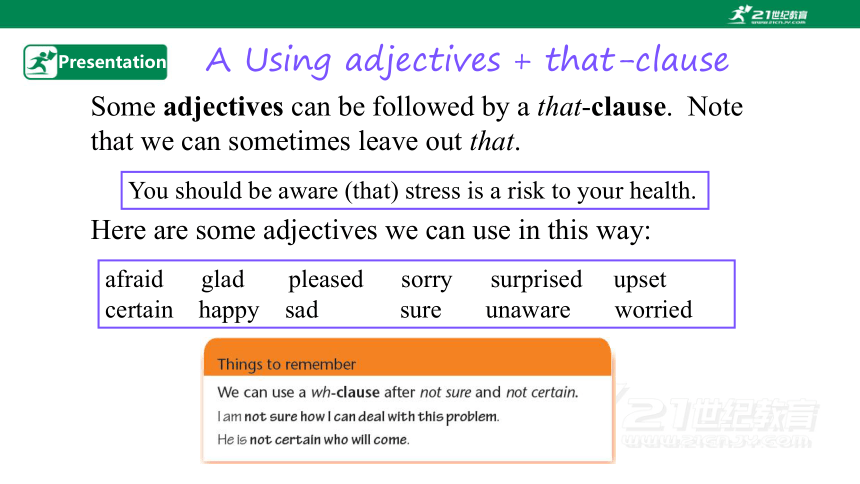
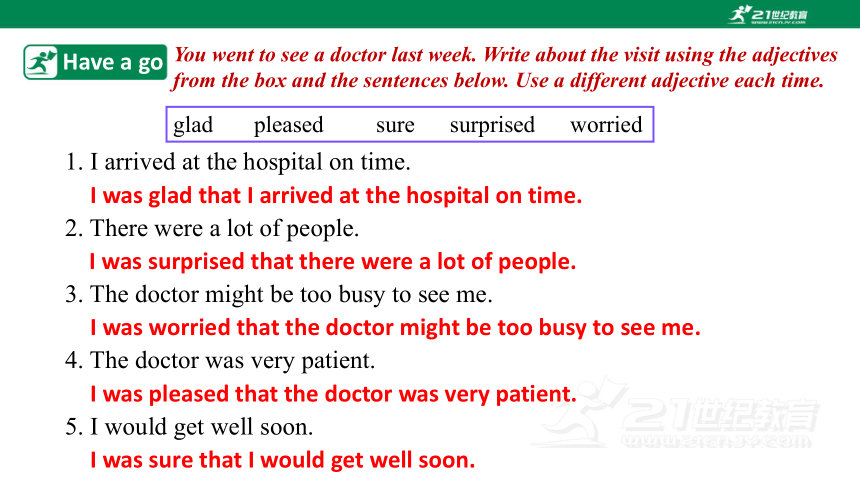
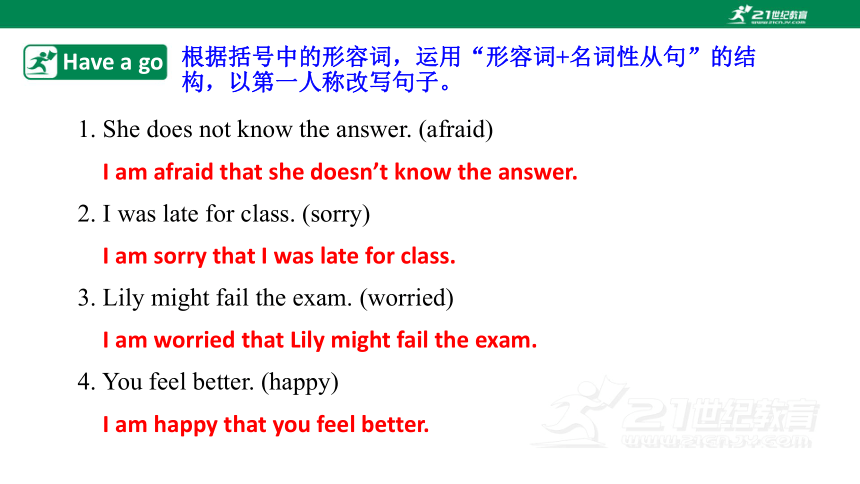
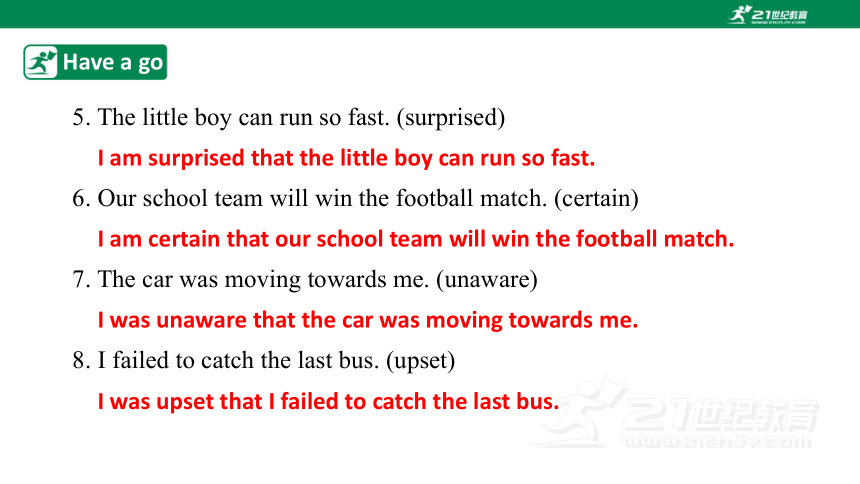
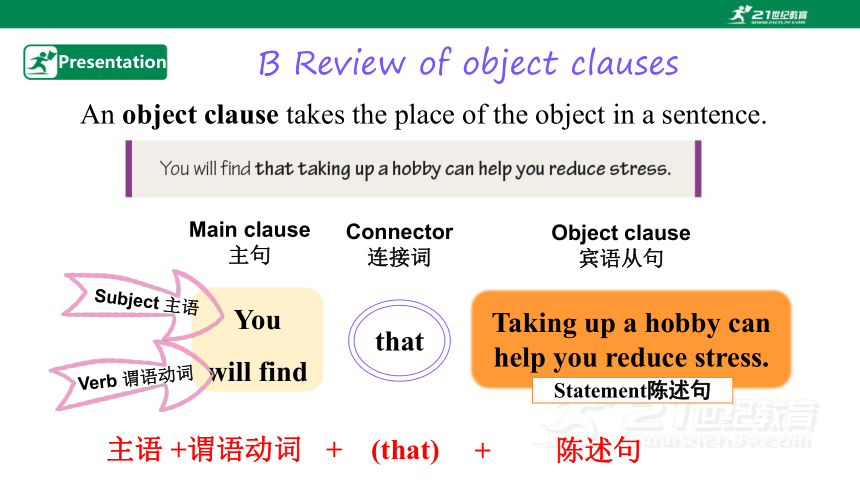
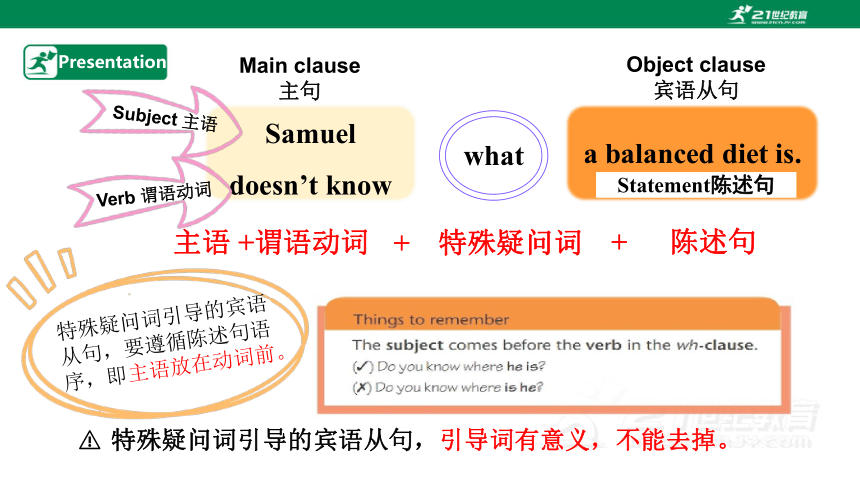
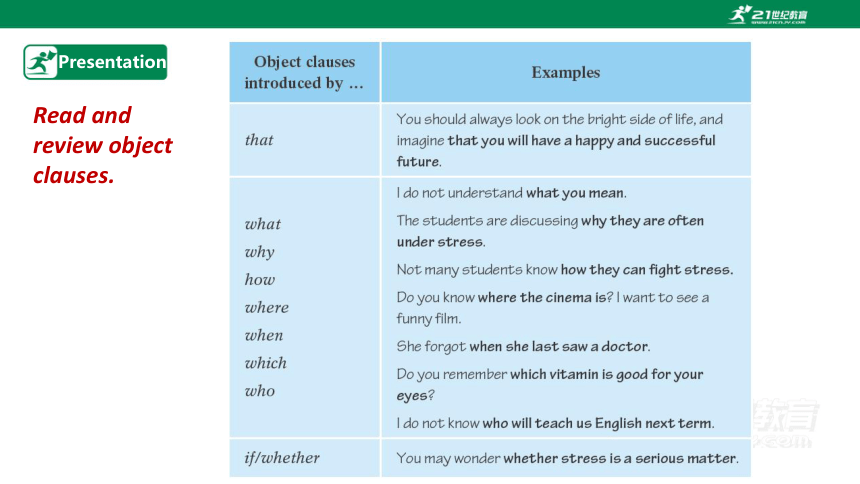
文档简介
(共34张PPT)
Unit 6 Caring for your health
Period 3 Grammar
牛津深圳·广州版 九年级下
Master adjectives+ that-clause
Be able to use object clauses in the correct context
Review the structure and usage of object clauses
Learning objects
Do you remember who they are
They are Samuel and Doris.
Do you remember what they are talking about
Healthy Diet!
Lead in
Lead in
Do you remember what these clauses are
I know they are Object Clauses.
I am happy that you remember what you have learnt.
What is “I am happy that” Is is an Object Clause.
Lead in
Some adjectives can be followed by a that-clause. Note
that we can sometimes leave out that.
You should be aware (that) stress is a risk to your health.
Here are some adjectives we can use in this way:
afraid glad pleased sorry surprised upset
certain happy sad sure unaware worried
A Using adjectives + that-clause
Presentation
glad pleased sure surprised worried
1. I arrived at the hospital on time.
I was glad that I arrived at the hospital on time.
2. There were a lot of people.
I was surprised that there were a lot of people.
3. The doctor might be too busy to see me.
I was worried that the doctor might be too busy to see me.
4. The doctor was very patient.
I was pleased that the doctor was very patient.
5. I would get well soon.
I was sure that I would get well soon.
You went to see a doctor last week. Write about the visit using the adjectives from the box and the sentences below. Use a different adjective each time.
Have a go
根据括号中的形容词,运用“形容词+名词性从句”的结构,以第一人称改写句子。
1. She does not know the answer. (afraid)
I am afraid that she doesn’t know the answer.
2. I was late for class. (sorry)
I am sorry that I was late for class.
3. Lily might fail the exam. (worried)
I am worried that Lily might fail the exam.
4. You feel better. (happy)
I am happy that you feel better.
Have a go
5. The little boy can run so fast. (surprised)
I am surprised that the little boy can run so fast.
6. Our school team will win the football match. (certain)
I am certain that our school team will win the football match.
7. The car was moving towards me. (unaware)
I was unaware that the car was moving towards me.
8. I failed to catch the last bus. (upset)
I was upset that I failed to catch the last bus.
Have a go
B Review of object clauses
An object clause takes the place of the object in a sentence.
You
will find
that
Taking up a hobby can help you reduce stress.
Main clause
主句
Connector
连接词
Object clause
宾语从句
Subject 主语
主语 +谓语动词
+ (that)
+ 陈述句
Statement陈述句
Verb 谓语动词
Presentation
a balanced diet is.
Object clause
宾语从句
特殊疑问词引导的宾语从句,要遵循陈述句语序,即主语放在动词前。
Samuel
doesn’t know
Main clause
主句
特殊疑问词引导的宾语从句,引导词有意义,不能去掉。
主语 +谓语动词
+ 特殊疑问词
+ 陈述句
Subject 主语
Verb 谓语动词
what
Statement陈述句
Presentation
Read and review object clauses.
Presentation
Read and learn.
subject(主语)+ verb(谓语) + indirect object (间接宾语)+that /wh-(引导词)+ clause(从句)
Sometimes there is an indirect object or a phrase with to before the object clause.
Presentation
B1 Complete the object clauses with the words from the box.
why
where
how
what
who
when
which
whether
Have a go
B2 Put the words in the correct order to make meaningful sentences.
He asked me how I dealt with peer pressure.
He says that my lifestyle is not healthy enough.
He wonders how I take care of my body.
I have learnt that laughter is a good medicine for stress.
She believes that it is important to eat a healthy diet.
Have a go
宾语从句
一、用作宾语的句子,叫宾语从句,位于及物动词或介词后面。
二、宾语从句的类型:宾语从句的类型取决于连接词,不同的连接词表示不同的意义。
Summary
宾语从句类别 连接词 例句
1. 表示陈述意义 that(在口语和非正式文体中可省略) We hope (that) you will enjoy your holiday.
宾语从句类别 连接词 例句
2. 表示对某个具体内容的疑问意义,如谁,谁的,什么,哪个,什么时候,什么地方,怎么样,为什么等 连接代词 Who whom whose what which Do you know who he is
He asked me whom I talked with just now.
Can you tell me whose book it is
Ask him what he wants.
Tell me which class you are in.
连接副词 when where how why Mike asked when the meeting started.
I wonder where I can post my letter.
Mother showed us how she made pizza.
He told Mr Wang why he was late for school.
Summary
宾语从句类别 连接词 例句
3. 表示对“能 否,是否,对否,有否”等的疑问意义 if, whether(如果句子有or (not)只能用whether) I wonder if/whether he can
drive a car.
We don’t know whether he
will come or not.
Summary
宾语从句类别 连接词 例句
4. 在glad, happy, afraid, sure等某 些形容词后面 上述各连接词,如果是that可省略 We are very glad (that) you have come to help us.
I’m afraid (that) it’s going to snow.
Are you sure when we will start
Summary
使用宾语从句时要注意:
1. 宾语从句表示疑问时,仍然要用陈述句语序。
2. 宾语从句的时态取决于主句的时态
主句时态 宾语从句时态
现在时(一般现在时,现在完成时) 可用所需的任何时态
过去时 用过去的某一时态
Summary
(根据主句时态)确定从句的时态
主句时态
从 句 时 态
连 接 前
连 接 后
一般现在时
时态保持不变
一般过去时
一般现在时
一般过去时
一般过去时
过去完成时
一般将来时
过去将来时
现在进行时
过去进行时
现在完成时
过去完成时
Summary
宾语从句的时态
I hear (that)
Jim ( be ) a worker two years ago.
Jim ( be ) an English teacher now.
Jim ( cook ) dinner tomorrow.
Jim ( sing ) a popular song now.
was
is
will cook
is singing
当主句是一般现在时,宾语从句的时态不作限制,我们可以根据句子的需要使用任何一种时态。(需要性原则)
Summary
当主句是一般过去时的时候,宾语从句必须运用相应的过去的某一种时态,从而达到主句和从句的相互一致。(呼应性原则)
He to Hong Kong .
He sick.
He a book .
He
He said
would go
was
was reading
his work.
had finished
Summary
当宾语从句说明的是客观存在的事实或者是客观存在的真理时,就不用受到主句时态的限制,仍是用一般现在时态。(特殊性原则)
He told me (that)
Summer after Spring .
is
I was told (that)
the sun much bigger than the moon.
is
no news good news.
My parents told me (that)
is
Summary
宾语从句三要素
引导词
that(陈述句 )
if/whether(一般疑问句 )
特殊疑问词(特殊疑问句)
时态
主句为一般现在时从句可为任何时态
主句为一般过去时
从句
一般过去时
过去将来时
过去进行时
过去完成时
语序
宾语从句的语序都为陈述句语序
客观真理 自然现象
公式定理 名言警句 时态不变
Summary
1. 主语+谓语动词+that 宾语从句
I hope (that) you will like the book.
2. 主语+be+形容词+that 宾语从句
I am sorry that you missed the last bus.
3. 主语+谓语动词+if/whether+宾语从句
I wonder if/whether you can afford the car.
4. 主语+谓语动词+疑问词+宾语从句
What don’t know what time it is.
Summary
Four patterns of object clause
1. --- Do you know ______ he didn’t come to the party
--- I don’t know. Maybe he was ill.
2. Could you tell me ______ the girl is under the tree
3. I’m looking for Mr White. Do you know _______ he is
4. --- He wanted to know ___________ you wanted to go fishing with him.
--- I promised to go.
5. I am excited ______ I will be an exchange student.
why
who
where
if / whether
一、用连接词if,whether,what,who,whose,which,where,when,why,how, that填空。
that
Exercise
6. These rules tell us ______ a sentence is broken down into phrases.
7. I can’t say ________ he will come to help us or not.
8. I will never forget ______ you’ve done for the poor children.
9. --- Could you tell me ______ we will have the party
--- On Saturday evening.
10. --- I’m wondering _______ digital camera it is.
--- It may be Lucy’s.
how
whether
what
when
whose
Exercise
( )1. I don’t know ________ the day after tomorrow.
A. when does he comes B. how will he come
C. whether he'll come D. if will he come
( )2. The teacher said that the Earth _______ around the Sun.
A. goes B. went C. will go D. has gone
( )3. — Could you tell me ________?
— Sorry, I don't know. I was not at the meeting.
A. what does he say at the meeting
B. what did he say at the meeting
C. what he says at the meeting
D. what he said at the meeting
二、单项选择
Exercise
C
A
D
( )4. — The light in Carl's room is still on. Do you know _____
— To prepare for the coming exam, I think.
A. why he stays up so late B. if he works hard
C. why is he so busy D. when he will stop working
( )5. — Betty, could you tell me ________
— About ten minutes.
A. how far is it from your home to school
B. how far it is from your home to school
C. how long does it take you to walk to school
D. how long it takes you to walk to school
Exercise
A
D
Homework
Finish Grammar exercise paper.
Early to bed and early to rise make a man healthy, wealthy and wise.
早睡早起,令人健康、富有而且聪明。
Reflection
谢谢
21世纪教育网(www.21cnjy.com)
中小学教育资源网站
兼职招聘:
https://www.21cnjy.com/recruitment/home/admin
Unit 6 Caring for your health
Period 3 Grammar
牛津深圳·广州版 九年级下
Master adjectives+ that-clause
Be able to use object clauses in the correct context
Review the structure and usage of object clauses
Learning objects
Do you remember who they are
They are Samuel and Doris.
Do you remember what they are talking about
Healthy Diet!
Lead in
Lead in
Do you remember what these clauses are
I know they are Object Clauses.
I am happy that you remember what you have learnt.
What is “I am happy that” Is is an Object Clause.
Lead in
Some adjectives can be followed by a that-clause. Note
that we can sometimes leave out that.
You should be aware (that) stress is a risk to your health.
Here are some adjectives we can use in this way:
afraid glad pleased sorry surprised upset
certain happy sad sure unaware worried
A Using adjectives + that-clause
Presentation
glad pleased sure surprised worried
1. I arrived at the hospital on time.
I was glad that I arrived at the hospital on time.
2. There were a lot of people.
I was surprised that there were a lot of people.
3. The doctor might be too busy to see me.
I was worried that the doctor might be too busy to see me.
4. The doctor was very patient.
I was pleased that the doctor was very patient.
5. I would get well soon.
I was sure that I would get well soon.
You went to see a doctor last week. Write about the visit using the adjectives from the box and the sentences below. Use a different adjective each time.
Have a go
根据括号中的形容词,运用“形容词+名词性从句”的结构,以第一人称改写句子。
1. She does not know the answer. (afraid)
I am afraid that she doesn’t know the answer.
2. I was late for class. (sorry)
I am sorry that I was late for class.
3. Lily might fail the exam. (worried)
I am worried that Lily might fail the exam.
4. You feel better. (happy)
I am happy that you feel better.
Have a go
5. The little boy can run so fast. (surprised)
I am surprised that the little boy can run so fast.
6. Our school team will win the football match. (certain)
I am certain that our school team will win the football match.
7. The car was moving towards me. (unaware)
I was unaware that the car was moving towards me.
8. I failed to catch the last bus. (upset)
I was upset that I failed to catch the last bus.
Have a go
B Review of object clauses
An object clause takes the place of the object in a sentence.
You
will find
that
Taking up a hobby can help you reduce stress.
Main clause
主句
Connector
连接词
Object clause
宾语从句
Subject 主语
主语 +谓语动词
+ (that)
+ 陈述句
Statement陈述句
Verb 谓语动词
Presentation
a balanced diet is.
Object clause
宾语从句
特殊疑问词引导的宾语从句,要遵循陈述句语序,即主语放在动词前。
Samuel
doesn’t know
Main clause
主句
特殊疑问词引导的宾语从句,引导词有意义,不能去掉。
主语 +谓语动词
+ 特殊疑问词
+ 陈述句
Subject 主语
Verb 谓语动词
what
Statement陈述句
Presentation
Read and review object clauses.
Presentation
Read and learn.
subject(主语)+ verb(谓语) + indirect object (间接宾语)+that /wh-(引导词)+ clause(从句)
Sometimes there is an indirect object or a phrase with to before the object clause.
Presentation
B1 Complete the object clauses with the words from the box.
why
where
how
what
who
when
which
whether
Have a go
B2 Put the words in the correct order to make meaningful sentences.
He asked me how I dealt with peer pressure.
He says that my lifestyle is not healthy enough.
He wonders how I take care of my body.
I have learnt that laughter is a good medicine for stress.
She believes that it is important to eat a healthy diet.
Have a go
宾语从句
一、用作宾语的句子,叫宾语从句,位于及物动词或介词后面。
二、宾语从句的类型:宾语从句的类型取决于连接词,不同的连接词表示不同的意义。
Summary
宾语从句类别 连接词 例句
1. 表示陈述意义 that(在口语和非正式文体中可省略) We hope (that) you will enjoy your holiday.
宾语从句类别 连接词 例句
2. 表示对某个具体内容的疑问意义,如谁,谁的,什么,哪个,什么时候,什么地方,怎么样,为什么等 连接代词 Who whom whose what which Do you know who he is
He asked me whom I talked with just now.
Can you tell me whose book it is
Ask him what he wants.
Tell me which class you are in.
连接副词 when where how why Mike asked when the meeting started.
I wonder where I can post my letter.
Mother showed us how she made pizza.
He told Mr Wang why he was late for school.
Summary
宾语从句类别 连接词 例句
3. 表示对“能 否,是否,对否,有否”等的疑问意义 if, whether(如果句子有or (not)只能用whether) I wonder if/whether he can
drive a car.
We don’t know whether he
will come or not.
Summary
宾语从句类别 连接词 例句
4. 在glad, happy, afraid, sure等某 些形容词后面 上述各连接词,如果是that可省略 We are very glad (that) you have come to help us.
I’m afraid (that) it’s going to snow.
Are you sure when we will start
Summary
使用宾语从句时要注意:
1. 宾语从句表示疑问时,仍然要用陈述句语序。
2. 宾语从句的时态取决于主句的时态
主句时态 宾语从句时态
现在时(一般现在时,现在完成时) 可用所需的任何时态
过去时 用过去的某一时态
Summary
(根据主句时态)确定从句的时态
主句时态
从 句 时 态
连 接 前
连 接 后
一般现在时
时态保持不变
一般过去时
一般现在时
一般过去时
一般过去时
过去完成时
一般将来时
过去将来时
现在进行时
过去进行时
现在完成时
过去完成时
Summary
宾语从句的时态
I hear (that)
Jim ( be ) a worker two years ago.
Jim ( be ) an English teacher now.
Jim ( cook ) dinner tomorrow.
Jim ( sing ) a popular song now.
was
is
will cook
is singing
当主句是一般现在时,宾语从句的时态不作限制,我们可以根据句子的需要使用任何一种时态。(需要性原则)
Summary
当主句是一般过去时的时候,宾语从句必须运用相应的过去的某一种时态,从而达到主句和从句的相互一致。(呼应性原则)
He to Hong Kong .
He sick.
He a book .
He
He said
would go
was
was reading
his work.
had finished
Summary
当宾语从句说明的是客观存在的事实或者是客观存在的真理时,就不用受到主句时态的限制,仍是用一般现在时态。(特殊性原则)
He told me (that)
Summer after Spring .
is
I was told (that)
the sun much bigger than the moon.
is
no news good news.
My parents told me (that)
is
Summary
宾语从句三要素
引导词
that(陈述句 )
if/whether(一般疑问句 )
特殊疑问词(特殊疑问句)
时态
主句为一般现在时从句可为任何时态
主句为一般过去时
从句
一般过去时
过去将来时
过去进行时
过去完成时
语序
宾语从句的语序都为陈述句语序
客观真理 自然现象
公式定理 名言警句 时态不变
Summary
1. 主语+谓语动词+that 宾语从句
I hope (that) you will like the book.
2. 主语+be+形容词+that 宾语从句
I am sorry that you missed the last bus.
3. 主语+谓语动词+if/whether+宾语从句
I wonder if/whether you can afford the car.
4. 主语+谓语动词+疑问词+宾语从句
What don’t know what time it is.
Summary
Four patterns of object clause
1. --- Do you know ______ he didn’t come to the party
--- I don’t know. Maybe he was ill.
2. Could you tell me ______ the girl is under the tree
3. I’m looking for Mr White. Do you know _______ he is
4. --- He wanted to know ___________ you wanted to go fishing with him.
--- I promised to go.
5. I am excited ______ I will be an exchange student.
why
who
where
if / whether
一、用连接词if,whether,what,who,whose,which,where,when,why,how, that填空。
that
Exercise
6. These rules tell us ______ a sentence is broken down into phrases.
7. I can’t say ________ he will come to help us or not.
8. I will never forget ______ you’ve done for the poor children.
9. --- Could you tell me ______ we will have the party
--- On Saturday evening.
10. --- I’m wondering _______ digital camera it is.
--- It may be Lucy’s.
how
whether
what
when
whose
Exercise
( )1. I don’t know ________ the day after tomorrow.
A. when does he comes B. how will he come
C. whether he'll come D. if will he come
( )2. The teacher said that the Earth _______ around the Sun.
A. goes B. went C. will go D. has gone
( )3. — Could you tell me ________?
— Sorry, I don't know. I was not at the meeting.
A. what does he say at the meeting
B. what did he say at the meeting
C. what he says at the meeting
D. what he said at the meeting
二、单项选择
Exercise
C
A
D
( )4. — The light in Carl's room is still on. Do you know _____
— To prepare for the coming exam, I think.
A. why he stays up so late B. if he works hard
C. why is he so busy D. when he will stop working
( )5. — Betty, could you tell me ________
— About ten minutes.
A. how far is it from your home to school
B. how far it is from your home to school
C. how long does it take you to walk to school
D. how long it takes you to walk to school
Exercise
A
D
Homework
Finish Grammar exercise paper.
Early to bed and early to rise make a man healthy, wealthy and wise.
早睡早起,令人健康、富有而且聪明。
Reflection
谢谢
21世纪教育网(www.21cnjy.com)
中小学教育资源网站
兼职招聘:
https://www.21cnjy.com/recruitment/home/admin
